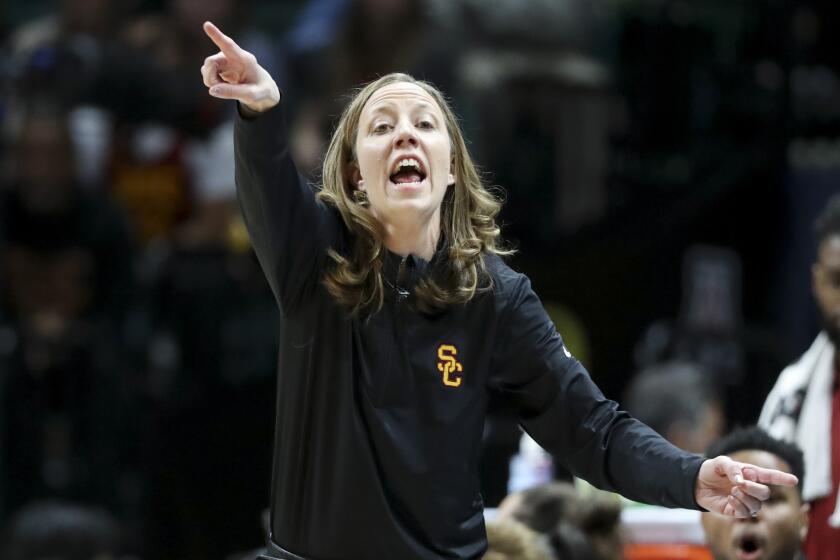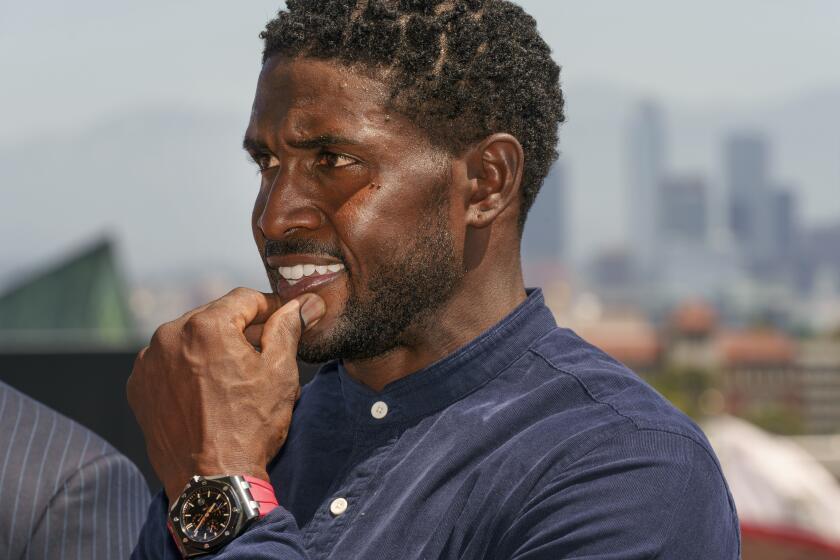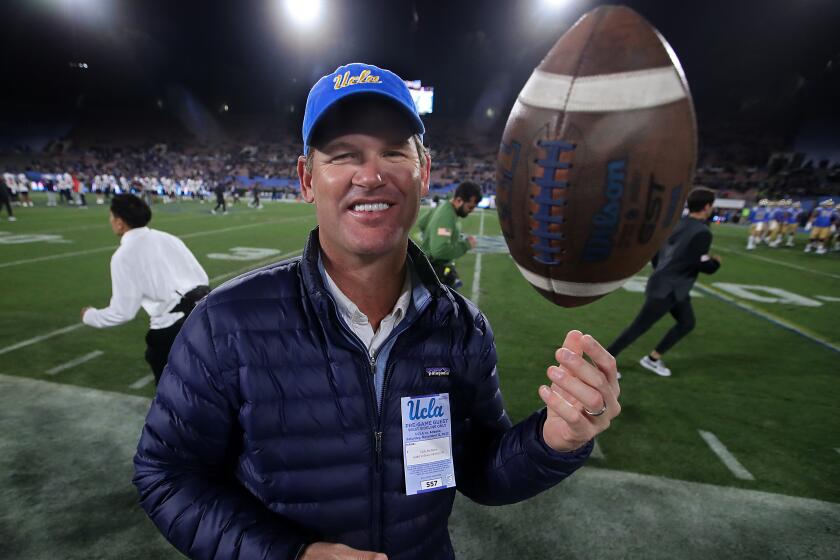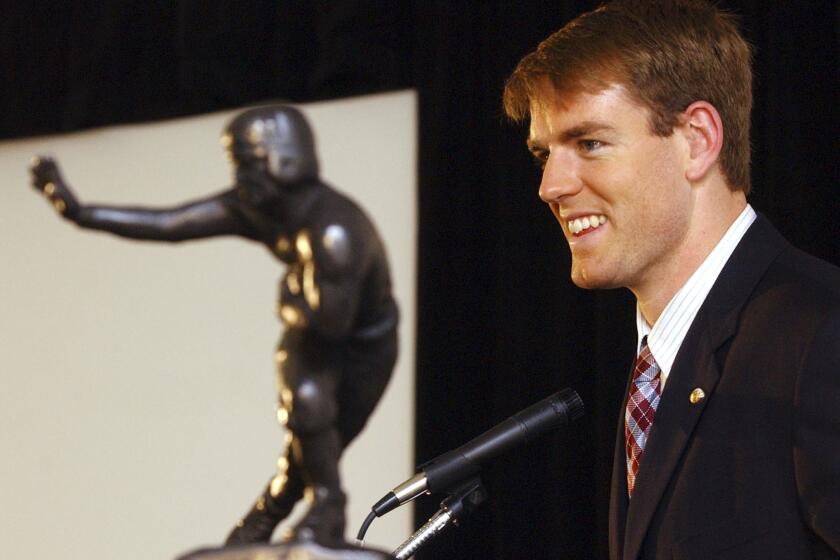Column: The latest athletic scandal shows it’s time for USC (and other universities) to dump big-money sports
September is a month with an “r” in it, so it must be time for another scandal involving big-time university athletics.
Sure enough, here comes the U.S. Department of Justice, with sweeping allegations of fraud and corruption among coaches and assorted hangers-on connected to Division I college basketball. Unhappily, the University of Southern California is right in the middle of the case. Its associate head basketball coach, Anthony Bland, is accused of accepting at least $13,000 in bribes to steer players under his influence toward certain business and financial advisors once the players entered the National Basketball Assn. Bland appeared Tuesday in federal court in Tampa, Fla., where he was arrested, and was released on a $100,000 bond.
The stench extends well beyond USC. Ten individuals, including four Division I basketball coaches, an executive of Adidas, and assorted sports agent and management types, were named in the federal complaints. University of Louisville basketball head coach Rick Pitino was reportedly fired Wednesday in connection with the scandal, even though he wasn’t named in the federal complaints.
The defendants allegedly exploited the hoop dreams of student-athletes around the country.
— Acting U.S. Atty. Joon H. Kim
“The picture of college basketball painted by the charges is not a pretty one,” thundered acting U.S. Atty. Joon H. Kim of New York, who brought the charges.
Kim spoke of “coaches at some of the nation’s top programs taking cash bribes, managers and advisors circling blue-chip prospects like coyotes ….The defendants allegedly exploited the hoop dreams of student-athletes around the country, treating them as little more than opportunities to enrich themselves through bribery and fraud schemes.”
Joon also said the defendants’ conduct “sullied the spirit of amateur athletics.” But the underlying truth of his case is that, among big-name college basketball programs, there’s scarcely any amateur spirit left to be sullied. None of the alleged behavior could have occurred if these programs weren’t actually farm teams for the professional NBA masquerading as college sports, their most important players pros-in-training pretending to be “student-athletes.”
This is merely another example of why Division I basketball and football programs need to be split off from their universities, permanently. The parade of scandals — recruiting scandals, bribery scandals, grade-fixing scandals — only tarnish their institutions’ academic reputations. Some of them earn big bucks for the universities, but at immeasurable cost.
We’ve written before that trying to clean up this swamp is an impossible task. University administrators are so dazzled by the supposed glory of their basketball and football teams that they’re blinded to the fundamental incompatibilities between running a massively profitable business and running an academic institution. It will be said that the programs afford unique opportunities for kids from poor neighborhoods to launch lucrative pro careers, but typically they’re taking advantage of immature youngsters whose talents they exploit largely for free.
Student-athletes? The “one-and-done” pattern in basketball exposes the term as rank hypocrisy — these are high-schoolers brought to college for a single year to meet NBA draft eligibility rules, and they come to campus with their eyes already focused on the main chance awaiting them in the pros.
Two players said to have been the objects of Bland’s dealings with the figures allegedly paying him off were a 17-year-old incoming freshman and a rising sophomore: kids with massive riches beckoning once they left USC, available to be siphoned off.
The most common defenses of big-time basketball and football are that: (1) they build reputations for their schools and thus help in fundraising, and (2) they bring in so much money at the turnstiles and merchandise booths that they help fund lower-profile sports, including women’s programs. At USC, the football team earned a profit of $20 million in 2015-16, according to the school’s federal disclosure; the basketball program ran slightly in the red. But is it worth the money, if the harvest is a sheaf of federal charges of fraud and corruption and recurring charges of exploitation of “student-athletes” for financial gain?
According to a tape the feds say they have, Bland allegedly told his partners in the scheme in one meeting: “We got us a gold mine over here.” Who’s collecting the gold?
In the federal complaints unsealed on Tuesday, USC is identified as “University-5.” That’s the equivalent of being marched before the public with a raincoat over your head, like an indicted mobster. It’s not something to be proud of.
The allegations did, however, afford USC athletic director Lynn Swann an opportunity to attest that “USC athletics maintains the highest standards in athletic compliance across all of our programs and does not tolerate misconduct in any way.” Yes, uh-huh, right. Swann must be hoping that people have short memories and take it as gospel that he’s cleaned up the scandal-plagued program at USC.
As my colleague Nathan Fenno reminds us, however, USC self-imposed sanctions on its basketball program in 2010, a half-step ahead of a likely finding by the NCAA investigation that guard O.J. Mayo and people close to him had accepted cash, lodging, transportation, a cellphone, a television, watches, shoes and clothing from Rodney Guillory, an event promoter representing a sports agent.The team was barred from the 2009-10 postseason, lost one scholarship a year over two seasons, vacated 21 wins from the 2007-08 season and returned about $206,000 for its participation in the NCAA tournament. Mayo spent a year at USC and then was drafted by the NBA Minnesota Timberwolves.
Swann also said the school was “shocked” to learn of Bland’s alleged activities. Interestingly, that was similar to how then-coach Kevin O’Neill described his team’s reaction to the sanctions in 2010. “Shocked and saddened” was the full quote then.
And that’s not to mention the record of USC’s football program, which was slammed with sanctions in 2010 connected to allegations of improper payments to running back Reggie Bush and his family. The sanctions are still highly controversial, in part because the NCAA’s evidence was equivocal.
Some academic leaders have acknowledged that big-time sports and academic integrity can’t coexist. Back in 2000, James Duderstadt, a former president of the University of Michigan and former chairman of the Big-10 Conference, wrote that major colleges’ football and basketball programs had become irreversibly “transformed into big-time show business.” As a result, he said, their objectives “have become market share and commercial value, and the welfare of their players as students has been largely ignored.”
That’s only become more true with time. Duderstadt and others have advocated turning Division I basketball and football teams into semi-pro or professional farm teams, recognizing their true character, and restoring the on-campus programs to the true amateur endeavors they originally were. Short of that, the only outcome will be more scandal.
Keep up to date with Michael Hiltzik. Follow @hiltzikm on Twitter, see his Facebook page, or email michael.hiltzik@latimes.com.
Return to Michael Hiltzik’s blog.
Go beyond the scoreboard
Get the latest on L.A.'s teams in the daily Sports Report newsletter.
You may occasionally receive promotional content from the Los Angeles Times.




